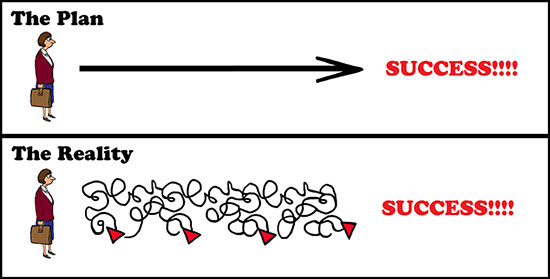No Great Thing is Created Suddenly – or in other words “No great thing cometh suddenly into being” a quote which can be found in the Teaching of Epictetus, a collection of references that includes his famous handbook Enchiridion of Epictetus, also known as “The Manual” along with some of his other discourses.
Epictetus was born into slavery and up until around the age of 18 he had limited opportunities during this time. Nevertheless, long before he died, he was considered as one of the most sought-after philosophers during his time. His teachings had even influenced other famous thinkers such as emperor Marcus Aurelius himself.
Who Was Epictetus?
Epictetus was a Greek philosopher born into slavery in 50 A.D. He spent most of his early years in Rome serving Epaphroditos a wealthy individual who was a secretary to emperor Nero.
Despite being a slave, Epictetus still found a way to attend the lectures conducted by Musonius Rufus, a stoic teacher, and philosopher. Epictetus would continue practicing this philosophy even after attaining freedom. Some time becoming a free man he was banished from Rome by Emperor Domitian because of his and his colleagues’ favor of the emperor’s opponents. Consequently, he fled to Nicopolis a capital city of Epirus, then a Roman Province where he was able to establish a school of philosophy and teach. Epictetus never produced any written material and most of what we know about his teachings was captured in writing by his pupil Arrian who spoke highly of his mentor.
What is the Meaning of the Quote?
No great thing cometh suddenly into being, for not even a bunch of grapes can, or a fig. If you say to me now: I desire a fig, I answer that there is need of time: let it first of all flower, and then bring forth the fruit, and then ripen. When the fruit of a fig-tree is not perfected at once, and in a single hour, would you win the fruit of a man’s mind thus quickly and easily? Even if I say to you, expect it not. Chapter VII. To the Learner, The Teachings of Epictetus
Knowledge, wisdom, wealth, or anything that is of value is not something that usually comes to us easily. For anything worthwhile to come into being, patience, focus, and consistent effort are absolutely necessary. This teaching of Epictetus is as much true today as it was in his time. In every aspect of life, nothing great is suddenly created. It can only be realized in time so long as the necessary effort is invested.
Epictetus’s Outlook on Life
The Enchiridion of Epictetus is a concise handbook that vividly showcases the philosopher’s outlook on life. It touches on a variety topics from happiness to conflict.
There are things which are within our power, and there are things which are beyond our power. Within our power are opinion, aim, desire, aversion, and, in one word, whatever affairs are our own. Beyond our power are body, property, reputation, office, and, in one word, whatever are not properly our own affairs. The Enchiridion, I
Epictetus accepts that life circumstances simply occur and they can either be influenced by us or are entirely out of our control. Patience can be a powerful tool when acknowledging both situations. Patience allows us to deal with the things that we cannot control. It also allows us to calmly put in the work despite frustrations to ensure that the things that we do have control over are realized.
The Importance of Patience
Patience is essential in navigating the demands of daily life. It is an important and useful life skill and its consistent practice allows us to not only gain a better tolerance for the hardships of life but also increase our well-being as we are more likely to see our goals through to the end. Patience is indeed a virtue that can transform our lives. It can leave positive effects on life’s every aspect from our relationships and health to our career and goal-setting.

Individuals who lack patience often fall victim to the belief that good things can happen “overnight.” These individuals get easily discouraged when they run into obstacles while working on their goal. It is no surprise that a great number of them believe that acquiring wealth can be easy, often resorting to “get rich quick” schemes that will more likely result in the opposite of what they intended.
If one fails to practice the skill of being patient, one runs the risk of living an unfulfilled life without self-control or the ability to tolerate, let alone effectively navigate adversity.
Cultivating Patience
Much like any other essential life skill, patience can be learned and practiced. Cultivating patience in our lives provides tons of benefits especially when it comes to our behavior, decision-making, compassion, and empathy towards ourselves and others.
Here are a couple of ideas that can put you on the right track when it comes to developing patience
- Put yourself in someone else`s shoes
- Avoid seeking direct control
- Put things into perspective
- Take a break
Whenever you are dealing with people there is always a chance that some kind of friction may arise. At the end of the day we all have different perspectives, personalities and upbringing. Therefore, sometimes we must take all of these details into account and try see the world from that individuals point of view. That does not mean we must immediately agree with their perspective, yet when it comes to sending your own point across, you will be more effective and come across as polite and understanding.
This can go contrary to our visceral impulses, to assume that other person is just like us and they just don`t want to understand us.
Sometimes instead of trying to practice patience we must find the root cause for our impatience. And the root of impatience usually comes down to individuals needing to make something happen exactly the way they want and when they want. The problem arises when things do not go as planned and so we try and force them to go our way and when they still don`t, we cling on to an illusion of what we imagined instead of what is actually happening. Eventually, the reality sets in and we are forced to react negatively to the outcome. But flexibility is power, the flower bends to face the sun, the river flows around the rock. In order to stay patient you must stay adaptive and flexible.

Many times we evaluate events based on a short timeframe. Let`s say for example the cashier was rude to you at the checkout till or someone cut you off in traffic, rather quickly you will start noticing inside yourself the incitement of feelings of anger, revenge or sadness. Having these feelings in the moment is natural (although they will also tend to fade the more you practice patience).
The issue arises when you impulsively act on them or hold on to them for a whole day and may be even longer. You see, your whole day may be filled with numerous positive events however as human beings we tend to focus on the negative. Especially the negative that does not matter in the long run.
Hence, to become more patient in these moments just ask yourself a simple question: “Will this negative event effect my whole month, my whole year or many years to come?” If the answer is “no” then ignore it. If the answer is “yes”, then it might be time to take some action and set some boundaries, remember being patient is not the same as being a pushover.
Human beings are not infallible, if we are constantly going through stress, most of us are going to eventually snap. To avoid this scenario we must always allow for some cool down time during the day.
What it all comes down to, patience can make us a better person in every way. Cultivating this virtue allows us to calmly face dire situations and create a happier, more rewarding, and peaceful life.

